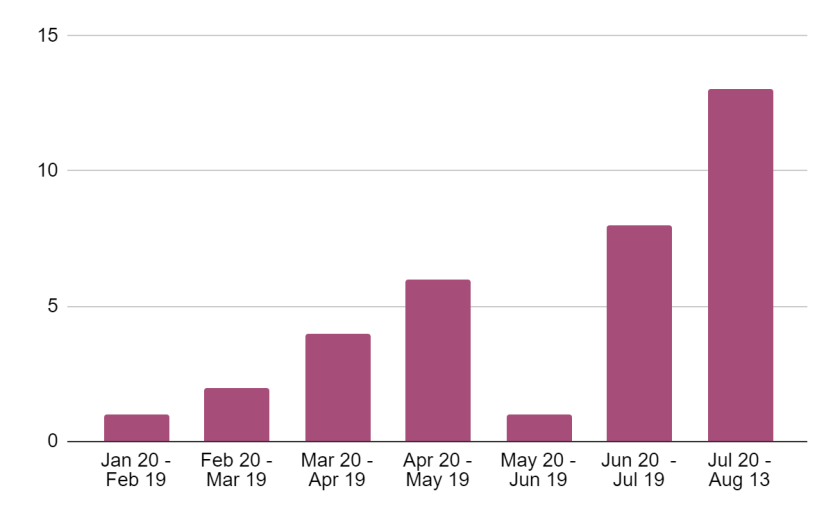© Semen Salivanchuk via Canva.com
Between July 20 and August 13, 2023, 13 journalists were reportedly detained by Taliban forces across eight provinces of Afghanistan. Twelve were reportedly arrested within a two-week period. The increase in arrests comes after the Taliban Minister of Publications – part of the Ministry of Information and Culture – Muhajir Farahi, announced the beginning of the distribution of ID cards for journalists on July 25. Farahi explained on X (formerly Twitter) that the cards are handed out to reporters who have official licences and are registered with the ministry. A local NGO promoting freedom of the press and media, Afghanistan Journalist Centre (AFJC), claimed that the issuing of ID cards will “provide the basis for more pressure and censorship”.
Reported repressions and arrests in Nangarhar
On July 31, less than a week after the announcement, Taliban forces reportedly attacked the Hamesha Bahar radio and television office located in Nangarhar’s provincial capital, Jalalabad, during a journalist training workshop. According to the AFJC, six female trainees were reportedly present at the event. According to unnamed sources quoted in media “[the Taliban] used inappropriate language and disparaging remarks towards the attendees, referring to the mixed gender training as an act encouraging prostitution and [sic] pull us out of a the office.”
On August 2, Amu TV, a digital multimedia platform focused on Afghan affairs, released a video report showing that the gate of the Hamesha Bahar office was closed on August 1. An Amu TV reporter in the video conveyed that the closure was due to the journalist training program for 16 people, including six young women. A radio employee mentioned in the interview that the Taliban forces visited the office before, making the staff “fearful” and added, “our colleagues could not come to work”.
According to the Amu TV reporter, the Independent Media Support Association in Nangarhar province reportedly criticised the Taliban for treating Hamesha Bahar workers “with intimidation and violence”. The head of Nangarhar’s Independent Media Support Association, also seen in the video, demanded that the security officials in Nangarhar clarify the issue, saying, “if there is a complaint, they must refer it to the media compliance department of the Ministry of Information and Culture; otherwise, it violates freedom of speech.” The Amu TV reporter added, “some journalists (…) allege the Taliban are destroying freedom of speech”. Another journalist speaking at the end of the video mentioned that the Taliban previously detained two journalists, including Erfanullah Baydar from Safar Radio in Nangarhar province.
On August 6, following the closure of the Hamesha Bahar radio and television office, the AFJC raised concern regarding the Taliban’s alleged decision to withhold the activity of Radio Nen and Radio Jowanan, located in the same building as the Hamesha Bahar office in Jalalabad. On August 10, the Taliban reportedly arrested two Killid Radio reporters, Faqir Mohammad Faqirzai and Jan Agha Saleh, in Jalalabad. Local media and reporters were also allegedly prevented from covering the meetings of senior Taliban authorities, which took place in the capital.
Arrests in other provinces
On July 21, four days before the journalist ID cards announcement, the Taliban reportedly arrested the founder and owner of Mumtaz Radio in Faryab, Alban Aminullah Alami. 10 days later, 8AM Media reported the alleged arrest of three journalists while covering a fire incident in Balkh on July 31. According to 8AM Media, the detained were identified as Ariana News reporter Najib Faryad and two local journalists, Hatef Aryan and Sebghatullah Turan.
On August 9, the AFJC announced that the Taliban reportedly arrested another local journalist, Sayed Wahdatullah Abdali, in Ghazni. The NGO added that Abdali was a Bakhtar state news agency employee and had been in the Taliban’s custody for three days. The next day, August 10, the Taliban reportedly arrested Haseeb Hassah, the reporter for Salam Watandar Radio in Kunduz.
The following arrests of four journalists occurred on August 11 and August 13, in Paktia and Kandahar provinces, respectively. The detainees were identified as Habibullah Sarab, a reporter for Ariana News, and journalists Attaullah Omar, Shams Omari, and Wahid al-Rahman. 8AM Media mentioned that the Taliban had arrested another journalist in Kunar province. Finally, on August 13, AFJC reported that the Taliban Information and Culture Department in Helmand Province allegedly warned local media not to publish women’s voices under any circumstances.
Analysis: highest number of recorded journalist arrests since January 2023
The timeline infographic below illustrates the escalation of incidents involving media following the nationwide distribution of ID cards for journalists on July 25. The timeline encompasses alleged detentions, assaults on media facilities, and additional constraints.

Figure: Reported repressions targeting media between July 25 and August 13. These events have not been independently verified by AW.
The number of arrests between July 20 and August 13 is the highest recorded by AW since January 2023, as shown in the graph below.

Figure: Chart illustrating the monthly number of reported arrests of journalists and media staff from January 20, 2023, to August 13, 2023. AW has not been able to independently verify these reports.
Since the Taliban takeover in 2021, Afghanistan has seen increased pressure and the gradual erosion of space for independent media and civil society. Between January 15, 2022, and July 20, 2023, AW recorded 316 claims of violations concerning civil society, human rights defenders, and media, including 98 claims of journalists, photographers and media commentators being arrested.
As of August 16, 2023, the Taliban have not commented on the incidents. One of the alleged detainees, journalist Mel Wahid al-Rahman, was reportedly released in Kandahar. The fate of the other journalists allegedly detained remains unknown.


